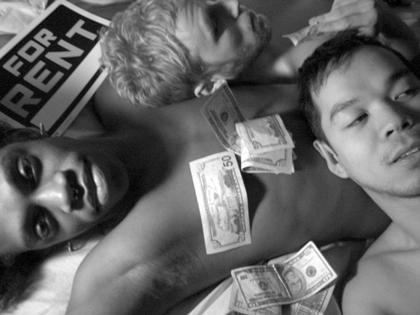The last word on FringeNYC
Playwright David Mann has fashioned a version of “The Godfather” as Shakespeare might have written it, in iambic pentameter, no less.
The Fringe Festival’s “Corleone” is a stunning work. Mann has telescoped a three-hour movie into an hour and 15-minute play that hits all the major themes—a full-scale homage. The play goes by fast and leaves you breathless at its daring.
The dialogue is wonderful, engaging, and the audience roars with laughter at familiar lines like “I made him an offer he can’t refuse.” Mann also inserts clever references to Shakespeare’s plays––the withered arm from “Richard II,” the ghost from “Hamlet,” and the murder of Julius Caesar. Of course, he can’t dramatize some of the more cinematic scenes from the movie, but he covers all the plot points with two narrators who appear periodically to move the story along.
The superb ensemble cast—mostly Shakespearean-trained actors—brings gravity and humor to their roles. Morgan Spector, who plays Vito Corleone, may be too young for the role, but he doesn’t make the mistake of trying to imitate Brando. Drew Cortese as Michael gives a faultless performance conveying how an ordinary man can be drawn into a life of crime out of a desire for vengeance.
Taking his cue from Gordon Willis’ low-key lighting in the film, the play’s lighting director keeps the atmosphere dark and foreboding. The set design is simple but perfect, with throne-like chairs used functionally and carried off when not needed.
The playwright is also the director and he does a fine job staging both the violence and the more contemplative moments. This is a play, which originated in a Minneapolis company and will be playing in theaters outside New York. It deserves an off-Broadway run.
“A Cool Breeze Off the River” has one of the best closing jokes since Joe E. Lewis told Jack Lemon “Nobody’s Perfect” at the end of “Some Like It Hot.” Unfortunately it’s the only funny line in the play despite the exertions of Brian Linden, playing a secondary role as Alex, the familiar flamboyant queen. Though overlong, slightly pedestrian, implausible, and repetitious, the show is watchable. This is largely due to the lead performances of Kyle Baxter––who also wrote the play––as the gay Sean and Jon Creefeld as Eric, a hunky straight man. The pair meets at a gym and before you’re prepared for it we’re expected to believe they become best friends. Eric is a stay-at-home husband who becomes broke and homeless when his shrill actress-wife, Rebecca (Kerry Fitzgibbons), the breadwinner of the family, leaves him. So he asks Sean if he can move in with him along with his son, E.J. whom his mother has also abandoned. The child actor, Jono Crefeld gives a naturalistic performance that is completely credible.
After little deliberation, Sean agrees but his friends don’t like Eric and think a straight man can’t live with a gay man. Naturally their resistance is overcome. When Rebecca has a change of heart and comes back to regain custody of her son, she threatens to play the gay card in court despite the fact that Sean and Eric are not sleeping together. Think “Kramer Vs. Kramer” and “The Next Best Thing,” or even “Object of My Affection.” This is a plot that should be retired.
“Don’t Ask” opens with an erotically charged tableau that promises delicious things to come but unfortunately they never arrive. Instead what we get is an avalanche of dialogue badly in need of an editor. The play clocks in at an hour and a half but this one-act two-character show could easily be 45 minutes.
Bill Quigley’s play does have moments of great power, due largely to the topicality of the material and the expert direction by Mark Steven Robinson. Set in Iraq in 2004, the backdrop is the prisoner abuse scandal. Two soldiers––a private and his superior––meet in a stockroom for sex and a sadomasochistic cat and mouse game ensues. Private Bobby McNeil (Daniel Dugan) has an insatiable appetite for sex, and Sergeant Charles Durham (Tom Flynn) is filled with self-disgust. Despite the difference in their rank, Bobby is the dominant one; his sexual demands produce fear and loathing in Charles, who has a family back home and is terrified the two men will be discovered. He’s the good soldier who only wants to serve. Bobby on the other hand may be psychotic. He may or may not have raped an imprisoned Iraqi soldier.
The play is about duty and conscience, but it takes a long time to get there, as Bobby changes his story. The dialogue is circular with much pleading for sex mixed with hints of guilt regarding prisoner abuse.
Tom Flynn is a powerful, appealingly masculine stage presence but he doesn’t have a large range. The sergeant would likely collapse in the face of having to turn Bobby in; but Flynn’s shouting when he’s in control masks the character’s deep vulnerabilities.
Daniel Dugan rattles off his lines so incessantly that all one wants to do is shut him up. He’s saddled with most of the speeches while the sergeant cowers at the far end of the stage.
This play doesn’t take sides on the wisdom and morality of the Iraq war––though Quigley does in an author’s note in the playbill. It confines itself to the prisoner abuse scandal and makes a statement about the perils of being in the closet. Both problems are terrible, and well defined here.
“Return of the Wayward Son” traps us in a sleazy hustler bar for two hours without intermission. Seven actors take the boards during this one act play and seldom leave the stage. The actors pair up serially and there’s a lot of overlapping action and dialogue taking place in various parts of the bar which makes it hard to know which conversation to pay attention to. Brian Fraley did the writing and directing and it’s hard to decide what he’s worse at. A semi-autobiographical tale, it’s about an innocent young man from the mid-West, Jimmy (Max Ferguson) who falls into male prostitution for unexplained reasons. Sure, it’s a fast way to make a buck but as Ferguson plays Jimmy it’s hard to believe he’s in the life. His cherubic face doesn’t give up any dark secrets. The bar is of course populated with hustlers and johns and the actors with the exception of Ferguson seem to be chosen for their maximum lack of appeal. There are plenty of badly simulated sex acts that are unerotic and even slightly unpleasant. The place is said by the playwright to be based on Rounds, the hustler bar that was closed by the authorities a decade or more ago. But Rounds was an upscale bar with a well-to-do gentlemen’s clientele. The seedy bar in the play more closely resembles the old Ninth Circle and the characters don’t look like they have much cash. The director keeps the actors running around the stage sometimes in circles for no good reason. Still, there are some moments of authenticity, as when the play delineates the relationship of prostitutes to their prey and to one another.
Billy the Mime studied with Marcel Marceau but his material is light years apart from his teacher’s. The astonishing thing about his work is that he takes on the trickiest and riskiest subjects and does so with great compassion and finesse. He makes them funny and touching. Consider this scenario: “Terry Scihavo, Adieu” in which he mimes the woman with the vacant smile that is so familiar from the television coverage. And he does it in good taste. Then there’s “The Abortion” in which the fetus is portrayed as experiencing pain during the procedure. He even does 9/11 in which he depicts the terrorists hijacking the plane, slitting the pilot’s throat, flying the doomed aircraft, and counting the 21 virgins that will be theirs in the afterlife. In “San Francisco, 1979” he depicts the wild promiscuity of the era and the advent of the AIDS epidemic. You have to pay strict attention to his movements because there are so many nuances. He also does conventional clown material in an unconventional way. He’s in a clown’s whiteface and red lips but the comparison ends there. “In the Clown and the Beautiful Girl” the clown dies from an overdose of heroin after his beloved rejects him. In “Thomas and Sally” he essays the sexual relationship between Thomas Jefferson and Sally, his slave. Billy works from a repertoire of material some of which didn’t make it into this show. One imagines they are equally daring; he’s a brilliant artist.
“Mrs. Darling’s Bed ‘n’ Board” is enlivened by extensive full-frontal male nudity but the play is pitched at such a hysterical level it’s difficult to care about more than the actors’ bodies. Set in London during World War II, it begins with the arrival of a shell-shocked soldier fresh from the battlefield. Private Levi Shirley (Kenny de Marco) has sustained an injury to his leg and is so traumatized and withdrawn he can barely speak to the middle-aged landlady, Mrs. Darling (Wendy Lawrence-James) who shows him to his room, flirting to no avail. He lies about having a fiancé named Agnes back home in Yorkshire whom he is about to marry. Shirley later confesses that he’s a virgin and that Agnes is no more than a schoolyard friend. Darling competes for the affection of the handsome private with another boarder, Mr. Wilfred (Pierce Starre) and they argue about whether Shirley is straight or gay. Turns out that Wilfred was the lover of Darling’s dead son and she has displaced the loss by caring for Wilfred as her own. They have a strange and not very credible relationship. Wilfred is near-psychotic, and encouraged by the writer-director Karlton Parris, Starre plays the role at a high decibel; he screams so much venom it’s hard to believe anyone would put up with him. Wilfred arranges to seduce Shirley, and then rejects him cruelly after sex. The play is filled with screaming, taunts, mind games, and obscure secrets. In the end one’s patience wears thin during this two hour and twenty minute production.
gaycitynews.com


































